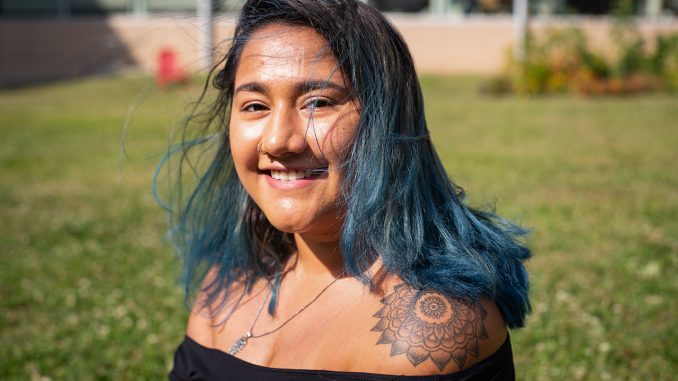
Traditional business standards affect how some Temple students with body modifications, like tattoos and piercings, navigate the workplace.
According to a 2013 survey by Salary.com, 76 percent of respondents felt tattoos and piercings hurt an applicant’s chances of being hired after a job interview, and 42 percent feel visible tattoos are always inappropriate at work. Fifty-five percent reported the same thing about body piercings.
Ajita Singh, a junior biology major, said having tattoos, a nose piercing and bright, blue hair has been a challenge for her entering a career in corporate pharmaceuticals.
Because of her appearance, classmates in group assignments have been surprised when she performs above their expectations, Singh said.
“When you have a look that is considered unprofessional, people also sometimes seem to think you’re unintelligent at the same time,” Singh said.
Laura Craig, the associate director of career development at the Temple Career Center, said the center advises students to present themselves in an appropriate, but comfortable manner, but some employers can be more conservative in job hiring, she added.
“There’s a lot of things in the job search that’s out of your control and the way people perceive you is out of your control,” Craig said.
Thirty-one percent of human resource managers cite tattoos as a physical attribute to most likely limit career potential, according to a 2011 survey by CareerBuilder.
In the month since Singh has dyed her hair blue, she has noticed a difference in the way she is perceived, particularly at the on-campus, part-time job fair hosted by the Career Center.
“I think until people see my resume and see my GPA and qualifications and see my previous job experiences they’re quite willing to write me off because of my appearance,” Singh said.
On the other hand, Singh said her nose piercing actually became more of a cultural identifier and has not been seen as unprofessional because of that.
“When people confirm that I’m Indian, then they realize, ‘Oh, it’s not really that far out that she’s in pharmacy,’” she said. “I chose to do pharmacy because it is personally what I found the most interesting, but it irks me that people think that Indians are only limited to this.”
Emma Nuttall, a sophomore advertising major, has 15 visible tattoos and a septum piercing, so she wears long sleeves during initial business meetings. An academic advisor suggested she do this when attending a job fair last year.
“She was just like, ‘Make sure you’re covered up as a great first impression’ and I was like, ‘That’s kind of annoying,’” she added.
Nuttall, who works as a marketing representative for Universal Music Group, believes her intended career path is more accepting to unconventional appearances.
“I was working [at] the Bastille show in Philly on Monday, and their band manager who I was working with was covered in tattoos, neck tattoos, chest tattoos, arm, hand, everything,” Nuttall said. “I know from speaking to people in the industry [that] like 20 years ago, someone that high up couldn’t have had that.”
Mariel Makalintal, a sophomore religion and English major who has a facial piercing, tattoos and a mohawk-like hairstyle, said as a non-binary person, they find the LGBTQ community more tolerant toward unconventional looks, especially haircuts.
“When you’re in a more heteronormative professional setting, and you are someone who people see as a woman and they see you with short hair, you’re received much worse,” Makalintal said.
Makalintal has not had many experiences where they have been judged by an employer but said people should have autonomy over the way they present themselves.
“I don’t believe in giving a future employer or company control over the way that I choose to look for the rest of my life,” they added.
Singh said she feels people are now judged by the quality of their work more than appearances, and the stigma around non-traditional looks in the workplace is changing.
“In initial glances, people tend to make a certain type of judgment about you based on how you look, but it’s more a matter of personality that dictates your professionalism than anything else,” Singh said.



Be the first to comment